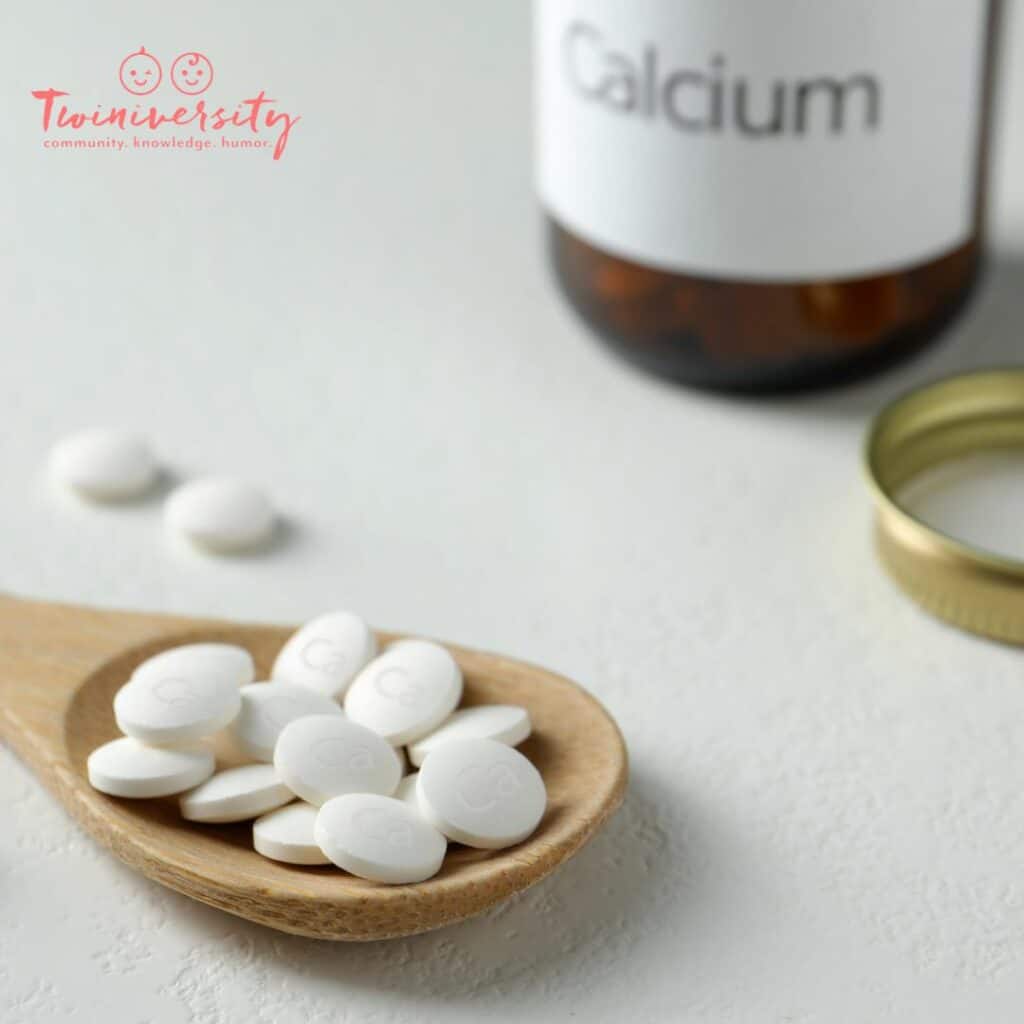Last updated on November 1st, 2023 at 01:37 pm

All content on this website, including medical opinions and any other health-related information, is for informational purposes only and should not be considered to be a specific diagnosis or treatment plan for any individual situation. Use of this site and the information contained herein does not create a doctor-patient relationship. Always seek the direct advice of your own doctor in connection with any questions or issues you may have regarding your own health or the health of others.
Are you pregnant? Are you constantly craving milkshakes, ice cream sundaes, and all the Ben and Jerry’s you can eat? Cravings are normal in pregnancy, and although there really isn’t any science behind what they mean, if dairy products and other foods that are rich in calcium are your current craving obsession, you could have a calcium deficiency. Do you know how important calcium is during pregnancy? Let’s find out why.

Why Is Calcium Important During Pregnancy?
Calcium is one of the most important and abundant minerals in the human body. Your body needs calcium to build and maintain strong bones, as well as your heart, muscles, and nerves to function properly. It’s no surprise that calcium is also extremely important when pregnant.
Calcium supports the fetus’s developing musculoskeletal, nervous, and circulatory systems. Plus, it can lower the overall risk of preeclampsia, low birth weight, and preterm delivery.
Your body will do whatever it needs to take care of your baby, including taking vital nutrients from you and giving them to your baby. Your body will take calcium from your bones to give to your little one. So if you want your bones to stay strong, you must get enough calcium during your pregnancy.
Have you taken your expecting twins class yet? We offer a great class on demand so you can take it on your own schedule! There are so many video modules covering everything from your twins’ baby registry to your first week at home with twins! Sign up today to get started before your twins arrive.
How Much Calcium Do You Need When Pregnant?
Calcium needs during pregnancy vary by age and number of fetuses.
- 18 years of age or younger: need at least 1,300 mg of calcium every day
- Over the age of 18: need at least 1,000 mg of calcium every day
- Expecting twins: 1,500 mg per day is recommended
- Carrying triplets: 2,000 mg per day
Your body can’t make calcium, so you must get it from the food you eat or from a supplement.
What Are Some Good Food Sources of Calcium?

Most people associate milk with calcium, but calcium is actually found in many foods. Fruits, leafy greens, beans, nuts, and some starchy vegetables are good sources of calcium.
Calcium-rich foods:
| Dairy Ricotta cheese Yogurt Milk Mozzarella cheese Cheddar cheese American cheese Feta cheese Cottage cheese Frozen yogurt Ice cream Parmesan cheese | Fruit/Vegetables Collard greens Broccoli rabe Cress Kale Green soybeans Bok choy Rhubarb Figs (dried) Broccoli Oranges |
| Fish Sardines Salmon Shrimp | Beans White beans Chickpeas Red beans |
If you’re allergic to milk, are lactose intolerant, or are vegan, getting enough calcium from food can be difficult. If you don’t get enough from food, your doctor may recommend a calcium supplement.
Should You Take a Calcium Supplement When Pregnant?
If you are unable to get your daily intake of calcium from the foods you eat, you may have to get it from a supplement. It’s important to talk to your doctor before taking any supplements during pregnancy. Your doctor can help you determine if a supplement is right for you and what type of supplement to take.

Calcium Supplements Come In Two Forms:
- Carbonate
- Calcium carbonate is less expensive
- Works best if you take it with food
- Available in pill/capsule form, soft chews, or gummies
- Found in antacids and used to relieve heartburn, acid indigestion, and upset stomach.
- Citrate:
- Calcium citrate is equally effective but more expensive
- Can be taken with food or on an empty stomach.
- Available in pill/capsule form or soft chews
Many calcium supplements also contain vitamin D. Vitamin D plays an important role in helping the body absorb calcium. It also helps to reduce inflammation, which can help reduce pregnancy complications. To make sure your body absorbs the most calcium possible, you should only take 500 mg of calcium at a time. This means during your twin pregnancy you will have to take 500 mg at breakfast, lunch, and dinner.
Women who don’t get enough calcium in their diets can benefit from taking calcium supplements during pregnancy, which may help protect against preeclampsia and preterm births, while also improving maternal and infant bone health.
Got twins? Us too! The Twiniversity Podcast with Natalie Diaz was created BY parents of twins FOR parents of twins, from your pregnancy days through your twin’s teenage years, this podcast covers it all. It’s all about parenting twins, offering plenty of strategies for making life better, parenting hacks, and, of course, humor. We are laughing WITH you every step of the way.
Prenatal vitamins do contain calcium. But, it’s not enough to cover your daily requirement. If considering a calcium supplement, don’t forget to factor in what you are already getting from your prenatal vitamin.
Are There Any Potential Side Effects of Calcium Supplements?
Calcium supplements cause few, side effects when taken correctly. However, taking too much calcium can lead to some side effects. If consuming too much calcium, your body might not be able to absorb all of it. This may cause you to feel gassy, bloated, or even experience constipation. If you are taking a calcium supplement and experiencing any of these side effects, be sure to talk to your doctor.
Can I Consume Too Much Calcium?
It is rare that you will get too much calcium from the foods that you eat. You are most likely to take in an excessive amount of calcium if you use supplements.
Ingesting too much calcium can cause:
- Constipation
- Kidney stones
- Possibly trouble absorbing other minerals, such as iron and zinc
- Irregular heartbeat
While you’re pregnant, don’t take more than 2,500 mg of calcium each day (3,000 mg if you’re 18 or younger).

What Are the Risks of Not Consuming Enough Calcium?
Taking too many calcium supplements can cause discomfort in your pregnancy, but not getting enough calcium can be harmful too.
Not consuming enough calcium can lead to:
- High blood pressure during pregnancy
- Premature birth
- Low birth weight
- Numbness and tingling in the fingers
- Slow growth of the baby
- The baby not getting enough calcium in the bones
- Heart problems
- Muscle and leg cramps
Pregnant women who do not consume sufficient amounts of calcium are at greater risk of developing osteoporosis later in life.

TWINIVERSITY TIP: Monitor your caffeine consumption. Caffeine is a natural diuretic. Which can cause your body to remove calcium through increased urination.
How to Eat More Calcium
If you enjoy milk then you’ll have no problem reaching your recommended daily calcium intake. But, if you aren’t a big fan of milk, it will be harder to get your daily calcium needs met. Here are some ways to add milk to your diet without having to drink glass after glass of plain milk.
- Make creamy oatmeal in the morning. Enjoying a bowl of oatmeal made with milk is a great way to get more calcium in your diet, and it tastes better too (you won’t even taste the milk, but you will notice it is much creamier).
- Top it with cheese. Add a little bit of cheese to your salads, soups, and other dishes.
- Make it creamy. Add some milk or evaporated milk to your recipes and make creamy soups, sauces, casseroles, mashed potatoes, mac and cheese, and other delicious dishes.
- Flavored milk. Have a glass of chocolate milk with lunch or dinner instead of a soda or another beverage. In colder weather, enjoy a hot chocolate made with milk instead of water.
- Snack on calcium-rich nuts like Brazil nuts or almonds. Keep a container of nuts and seeds with you and have a small handful as a daily snack.
- I scream, you scream, we all scream for ice cream! Enjoy a bowl of ice cream or frozen yogurt, a small milkshake, yogurt, a fruit smoothie, or some pudding for dessert.
It’s no surprise that calcium is an important nutrient during pregnancy. It helps support the development of your baby’s bones, muscles, and nerves, so make sure you are getting enough calcium from food (or supplements) to ensure your baby gets the nutrients they need. And remember, if you plan to breastfeed, you will want to continue consuming 1000 mg of calcium per day.

Twiniversity Staff Writer









